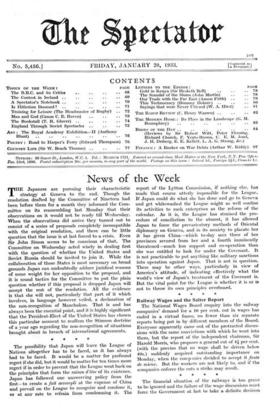The possibility that Japan will leave the League of Nations
altogether has to be faced, as it has always bad to be faced. It would be a matter for profound regret if she did, but it would be matter for ten times more regret if in order to prevent that the League went back on the principles that form the raison d'gtre of its existence. Japan has followed one unswerving policy from the first—to create a fait accompli at the expense of China add prevail on the League to recognize and condone it, or at any rate to refrain from condemning it. The
report of the Lytton Commission, if nothing else, has made that course utterly impossible for the League. If Japan could do what she has done and go to Geneva and get whitewashed the League might as well confine its activities to such enterprises as the reform of the calendar. As it is, the League has strained the pro- cedure of conciliation to the utmost, it has allowed Japan to force the prevaricatory methods of Oriental diplomacy on Geneva, and in its anxiety to placate her it has given China—which to-day sees three of her provinces severed from her and a fourth imminently threatened—much less support and co-operation than she was entitled to look for under the Covenant. It is not practicable to put anything like military sanctions into operation against Japan. That is not in question. There may be other ways, particularly in view of America's attitude, of indicating effectively what the world's view of Japan's treatment of the Covenant is. But the vital point for the League is whether it is or is not to throw its own principles overboard.








































